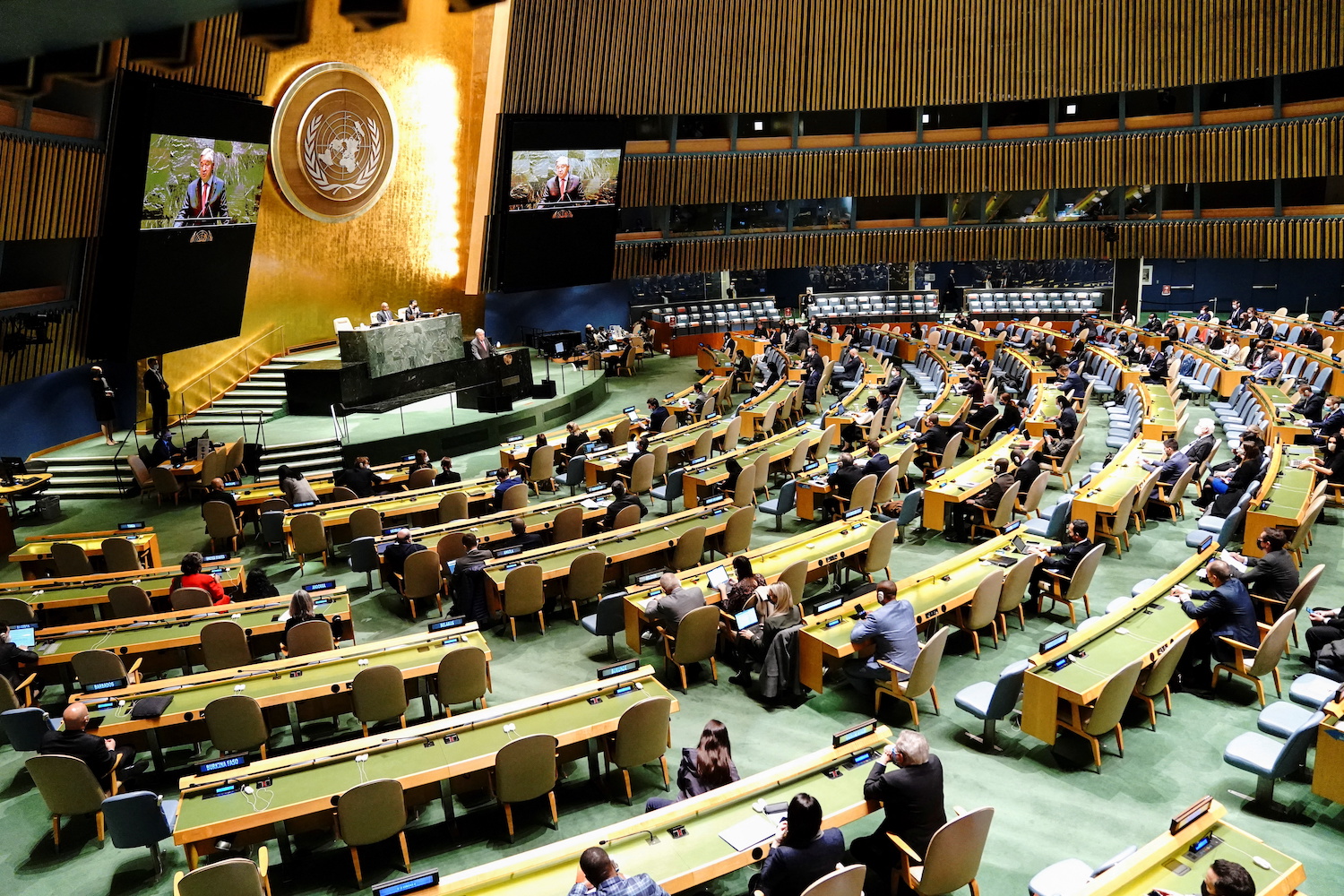NEW YORK: During a meeting at the UN on Wednesday, Gulf nations expressed great concern about the deteriorating situation in Ukraine and urged all participants to work to resolve the crisis through dialogue and diplomacy.
Speaking on behalf of the Gulf Cooperation Council, Abdulaziz Alateek, Saudi Arabia’s deputy permanent representative to the UN, expressed the council’s support for international efforts to encourage calm and a deescalation of tensions, and urged those involved in the conflict to begin political discussions in an effort to find a solution.
He appealed for the full implementation of Security Council Resolution 2202, which was unanimously adopted in 2015 and calls for a ceasefire in eastern Ukraine and the simultaneous withdrawal of all heavy weapons by both sides to create a security zone.
His remarks came during a plenary session of the UN General Assembly to discuss the latest developments in the long-simmering crisis along the eastern borders of Ukraine.
Western leaders on Wednesday sought to deter Moscow from launching a full-scale invasion of the country by imposing punishing sanctions on members of Russian President Vladimir Putin’s inner circle and threatening even harsher penalties should the Kremlin launch a military offensive.
The punitive actions were declared in response to the latest developments surrounding the deployment by Russia of 150,000 troops along three sides of its border with Ukraine.
While a full-scale invasion has not yet been launched, Russian forces on Tuesday rolled into the rebel-held Donetsk and Luhansk regions in eastern Ukraine after President Vladimir Putin officially recognized the independence of those separatist areas.
“Civilians do not have to pay the price for military escalation,” Alateek told the representatives of more 70 countries at the meeting. He said the GCC is “in favor of international law and the UN charter, particularly the principle of peaceful settlement of dispute, the non-use of force or the threat of use of force, as well as the principle of sovereignty and territorial integrity.”
Dmytro Kuleba, Ukraine’s foreign minister, said that Putin’s recognition of Donetsk and Luhansk as independent states constitutes “the ultimate blow to years of the peace process.”
He warned other member states that if Putin is not stopped, others will follow in his footsteps and “your government and people will face the same consequences as our government and our people.”
He added: “It is clear that Putin will not stop by himself. A war in Ukraine will be the end of the world order as we know it, a grim scenario that will throw us back in the darkness” of previous centuries.
Kuleba described the current situation as “the largest security crisis in Europe” since the Second World War, and said that any failure by the international community to respond properly will only add to the suffering, which “I regret to say it, it will not be limited to Ukraine.”
He added that “Russia must withdraw its forces from the territories of Ukraine,” and said that a swift response by the UN, commensurate with the gravity of the situation, would help to restore the credibility of the organization.
Vassily Nebenzia, Russia’s permanent representative to the UN, accused the Ukrainian government of conducting a “policy of deprivation of basic human rights against its own people.”
He said: “Kiev continues to bomb its own citizens and shirk from direct dialogue in the Donbas (region).
“Ukraine has been at war with its own citizens who do not agree with the current policy of the authorities. Western backers did nothing to ask Ukraine to heed its own people, which demonstrates double standards.”
He added that “amid this ‘genocide,’ Russia cannot remain indifferent.”
Nebenzia warned that “this conflict is by no means over. Shelling of residential areas in both republics (of Donetsk and Luhansk) has not ceased. We warn you, since the ceasefire will be monitored by Russian forces, no one intends to go softly-softly with any violators. We encourage you to rein Kiev in.”
The Russian envoy also criticized UN Secretary-General Antonio Guterres who, he said, “has followed the sad example of the West.” He also dismissed the UN chief’s offer of his “good offices” for a return to dialogue.
“We don’t understand what ‘good offices’ the secretary-general is talking about that can be provided,” he added.
Guterres had called for a ceasefire and the immediate restoration of the rule of law, describing the crisis as a “moment of peril I truly hoped would not come.”
Responding to Russia’s insistence that it is conducting a peacekeeping mission in eastern Ukraine, Guterres said that he is concerned about “the perversion of the concept of peacekeeping.”
He added: “When troops of one country enter the territory of another country without its consent, they are not impartial peacekeepers. They are not peacekeepers at all.”
Lord Tariq Ahmad of Wimbledon, the UK’s minister of state for the Commonwealth and United Nations, said his country has imposed “the largest sanctions package against Russia in the UK history.”
He added that the “Kremlin must understand the strength of the world’s condemnation of Putin’s choice of war” and “we must say to Russia very clearly: ‘Pull back; choose peace not war.’ And to the people of Ukraine: ‘We, the United Nations, stand with you.'”
Tobias Lindner, minister of state at the German Foreign Office, said: “we need to close ranks and strongly reject Russia’s actions. Otherwise, what happens to Ukraine today will happen to other (UN) members tomorrow.”
US envoy Linda Thomas-Greenfield warned: “If Russia continues down this path, it could (create) a new refugee crisis, one of the largest facing the world today, with as many as 5 million more people displaced by Russia’s war of choice, and putting pressure on Ukraine’s neighbors.
“Because Ukraine is one of the world’s largest wheat suppliers, especially for the developing world, Russia’s actions could cause a spike in food prices and lead to even more desperate hunger in places like Libya, Yemen and Lebanon.”




